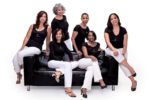The 4th Sunday Book Club was founded in the 1994 by six professional African-American women from the Washington, D.C. Metropolitan Area . These women shared a desire to read books of quality and substance and formed a loosely structured book club simply referred as “the book club”. The objective was to read books written by African-American authors. Over time the club diversified to include at least one non-fiction book per year and has grown beyond solely African-American authored works.
The book club, which met on fourth Sundays, soon found that contemporary literature did not reflect them or their lives. Motivated by this realization, the club began writing its own book. The result is Fourth Sunday: A Journey of Book Club, which was written under the pseudonym B.W. Read and published in May, 2011 by Strebor Books for Simon and Shuster. In honor of the success of the book, “the book club” was renamed “4th Sunday Book Club.” The 4th Sunday Book Club has grown in membership and purpose. The club now has 13 active members. However, it remains an unstructured, intimate club where books are our connection and our bond is our strength.
BPM: In your opinion, why is reading important in our lives?
Reading is important because it exposes us to experiences and information we may not otherwise encounter. Reading helps us to become more educated and well rounded. Books, like "A Wrinkle In Time" by Madeleine L'Engle, influence lives at an early stage and have lasting effects.
BPM: What types of books does your group read? How do you select the featured books?
The club reads11 books per year. At least one non-fiction and a book with a romantic theme or undertone are read each year in February. The club meets only once during the summer months, for a co-ed meeting where spouses or significant others are invited. Books are selected at the January meeting and are selected by consensus.
BPM: Is there anything you would love to see more of in books?
YES. More diversity including, but not limited to mixed race couples, gay characters that aren't caricatures or stereotypes, people doing meaningful things with their lives that make them happy, and people being accountable for the decisions (good and bad) they make without blaming society, lack of money or their parents.
